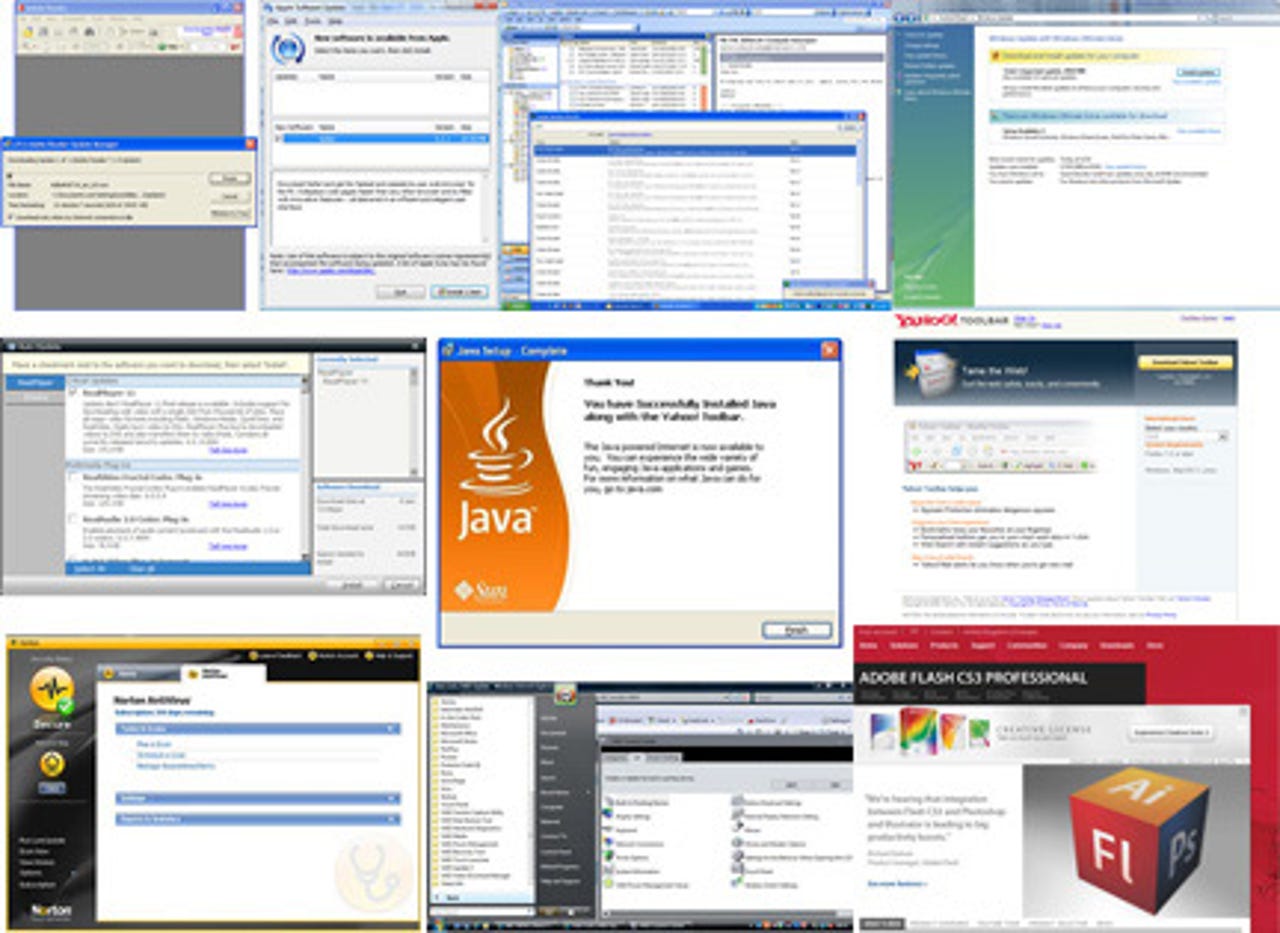Gallery: 10 most annoying programs on the Internet


And pain. For it allows what may have seemed like bright ideas at the time ('let's use it to make sure our customers have the latest software', for example) to turn into a stinking pit of misery — usually, but by no means always, after marketing gets its fangs in.
Here are just ten of the guilty parties who try to do the impossible: to make us hate the internet and wish it had never been invented — and who very nearly succeed.
This gallery was written by Rupert Goodwins, ZDNet.co.uk.
What does Adobe Reader do? Displays PDF pages. How does it do it? With as much bloody-minded bureaucracy, delay and needless interaction as possible. Perhaps it's because we humans have been spoiled by books, where the gap between wanting to read something and reading it is as short as the time taken to lift the cover. But Reader's incessant updates (demanding you reset your computer — why?), thundering great list of modules to load, and hour-glass-provoking pauses for thought have given Portable Document Format a reputation for being as welcome as a flatulent camel in the kitchen.
Which is a shame, because other lightweight PDF readers seem to manage perfectly well.
Oh, Apple. You created a domain where humans came first. You took usability and distilled it into an art form. Now look at you. iTunes is a music player the size of a fat-bottomed whale that gobbles resources like krill. It spends half its time trying to sell us stuff and the other half trying to stop us using it. But that's not as bad as your auto-update policy: slipping us stealth copies of Safari under the cover of important version updates to iTunes and Quicktime — what is this, Make Microsoft Look Good day?
Your machine will reset in four minutes. Your machine will not shut down until these five updates are installed. You must restart your machine now. You will install Microsoft Genuine Advantage. Please wait while these updates are installed. Please shut down all applications before applying this update. Pop! New updates are ready to be installed. And now that we've stopped you doing whatever it was you were doing (like we care), shall we go ahead and install them now, or would you rather be interrupted yet again later?
We've been kind and not talked about Vista.
If this software turned up at your door, you'd call the police. RealPlayer commits just about every sin in the book, sprinkling itself across your desktop and offering 'Free games!'. It installs a 'Message Center' that tells you about microcelebrities. There is more advertising embedded in the application than used to be on the front page of The Times. And you just wanted to stream The Archers.
At least Europe's been spared Real's Rhapsody music shop. When we looked at a beta before a subsequently abandoned UK launch, we were given software to install. 'Disable your firewall', it commanded. 'Drop dead', we replied.
Java doesn't do anything by itself. It's a programming language. Programming languages are like sewage plants: if the average user becomes aware of them, something's gone wrong.
Java doesn't know this. Java wants to be in your face. Java wants to be updated. Java wants to tell you the good news about Sun. Have you heard about Sun? Here's a nice picture of our logo. And fancy a copy of OpenOffice? No? Well, never mind. Java's installed a copy of Yahoo Toolbar in your browser instead. Because that's what programming languages are there to do, right?
And talking of Yahoo. Please stop. Please stop trying to take over my email, my search engine, my home page. Please stop 'updating' your IM client to include more emoticons, animations, noises and whatnot — or at least have the good grace to produce a grown-ups' edition I can use at work without feeling like I should still be reading Smash Hits. And yes, when I ask to exit the software, that's because I really want to, not because I'm having a crisis of doubt.
And there is absolutely no point in a toolbar that just replicates all the options on your web site's front page. Not unless you want to come across as the sort of shrill, desperate, needy software company that makes big noises about user relationships but in fact knows less about its users than the Queen does about shopping in Lidl.
It's a little unfair to pick on Norton Antivirus and make it carry the sins of half the desktop malware industry — but only a little unfair. If ever a class of software deserved to be cast into the lower reaches of Hell and run on Satan's own desktop, it is this. Performance- sapping, space-hogging, noisy, irritating and prone to inducing just as many problems as they purport to solve, these horrible, ineffective, expensive lumps of digital thuggery keep entire platoons of support engineers in business and home users in tears. We know. We get the phone calls.
After quarter of a century of the IBM PC, we still don't understand why so many companies feel obliged to create swathes of below-par software to install on the computers they sell. Notebook makers are the worst, and Sony the king of them all: the first job for any new Vaio owner is to strip out the layers of desktop 'enhancements', media 'managers' and system 'control software' that serve only to get in the way of doing things the way you know how to do them, interfere with other software packages and suck up such enormous amounts of resources on start-up that two weeks after you've bought one, you're still not sure whether it's broken or not.
Free, web-based email systems have more storage than you can use. They have powerful, accurate, swift search systems. They have clean interfaces, with threaded conversations and sane attachment management.
Then there's Microsoft's Outlook. Things have been getting better for those whose corporate upgrade strategy allows it, but with major updates happening every four years or so that's a long time to be looking at a non-threaded, licence-restricted storage- squeezed, treacle-slow-searching email system. Especially while the online services get better and better, and doubly so now that email is the single most important business application ever created.
There's nothing wrong with Flash, provided you don't use it to construct web sites where people want to find information, navigate easily or do anything beyond passively consume exactly what you choose to give them in exactly the way you've decided. There's also nothing wrong with using it for a splendid splash screen replete with movies, sound and animation — if you don't mind frustrating, annoying and possibly even driving away people who might, just might, have something better to do.
In fact, Flash-based web sites are quite possibly one of the most useful pieces of network technology around. Like heroin or microlights, they ensure that those who think it's a good idea aren't around to annoy us for too long.